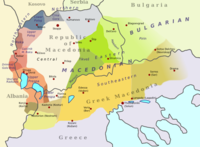Solun-Voden dialect: Difference between revisions
BalkanFever (talk | contribs) →Typical Words: translit |
More elegant: solve disambig and naming issues by explicitly stating topic domain in the lead. |
||
| Line 1: | Line 1: | ||
''' |
In Slavic dialectology, '''Solun-Voden dialect''' or '''Lower Vardar dialect''' refers to the dialects of [[Macedonian language|Macedonian]] traditionally spoken by Slavophone population groups in central [[Macedonia (Greece)|Greek Macedonia]]. It is called after the Slavic names of the cities of [[Thessaloniki]] (Solun) and [[Edessa, Greece|Edessa]] (Voden), or after the river [[Vardar]]. The dialect is classified as a member of the south-eastern subgroup of the Eastern and Southern group of [[dialects of the Macedonian language|Macedonian Slavic dialects]]. It is traditionally spoken in an area covering also [[Veria]] (Ber), [[Giannitsa]] (Enidže Vardar) and the surrounding region up to [[Thessaloniki]] (Solun) and the [[Aegean Sea]], as well as stretching into a small part of the [[Republic of Macedonia]]<ref>http://img46.imageshack.us/img46/5479/dijalektickamapath0.jpg</ref>. It is similar to the [[Ser-Drama-Lagadin-Nevrokop dialect]], [[Nestram-Kostenar dialect]] and [[Kostur dialect]]. |
||
==Phonological characteristic== |
==Phonological characteristic== |
||
Revision as of 11:26, 18 May 2008
In Slavic dialectology, Solun-Voden dialect or Lower Vardar dialect refers to the dialects of Macedonian traditionally spoken by Slavophone population groups in central Greek Macedonia. It is called after the Slavic names of the cities of Thessaloniki (Solun) and Edessa (Voden), or after the river Vardar. The dialect is classified as a member of the south-eastern subgroup of the Eastern and Southern group of Macedonian Slavic dialects. It is traditionally spoken in an area covering also Veria (Ber), Giannitsa (Enidže Vardar) and the surrounding region up to Thessaloniki (Solun) and the Aegean Sea, as well as stretching into a small part of the Republic of Macedonia[1]. It is similar to the Ser-Drama-Lagadin-Nevrokop dialect, Nestram-Kostenar dialect and Kostur dialect.
Phonological characteristic
- Retention of the Proto-Slavic schwa: Г’с/G's (IPA:/'gəs/) as opposed to Гас/Gas (IPA:/'gas/) (bottom)
- Retention of Proto-Slavic nasal vowels: Р'(н)ка/R'(n)ka (IPA:/'rɔ̃ka/) as opposed to Рака/Raka (IPA:/'raka/) (hand)
Morphological characteristic
- Use of the Prefix H; Убаво/Ubavo → Хубаво/Hubavo - (beautiful)
Other specific characteristics
- Use of the preposition У/U instead of the preposition Во/Vo : во село/ vo selo → у село / u selo - (in village)
- Use of the term Ут/Ut instead of the term От/Ot : Ут Солун/Ut Solun → Од Солун/Od Solun - (from/of Solun)
Typical Words
- Жарка/Žarka as opposed to Жаба/Žaba - frog
- Качамак/Kačamak - Polenta
- Xлучка/Hlučka as opposed to Oлцка/Olcka - hiccup
- Шарино/Šarino as opposed to Шарено/Šareno - coloured
- Кучја/Kučja as opposed to Куче/Kuče - dog
- Дjадо/Djado as opposed to Дедо/Dedo - Grandfather[2]
- Иштам/Ištam as opposed to Сакам/Sakam - I want
- Кушта/Kušta as opposed to Дома/Doma - home
- Манца/Manca - meal
- Другуш/Druguš as opposed to Друг пат/Drug pаt - another time
Typical Sayings
- Зевај ти р’нка/Zevaj ti r'nka - Shake someones hands [3]
- На чужд г’с, сто чумаки/Na cužd g's, sto čumaki - One hudread beatings on someone others back does not hurt all that much.
References
- ^ http://img46.imageshack.us/img46/5479/dijalektickamapath0.jpg
- ^ Only in the Easternmost parts
- ^ It is used when meeting a person, shake hands and then begin talking

